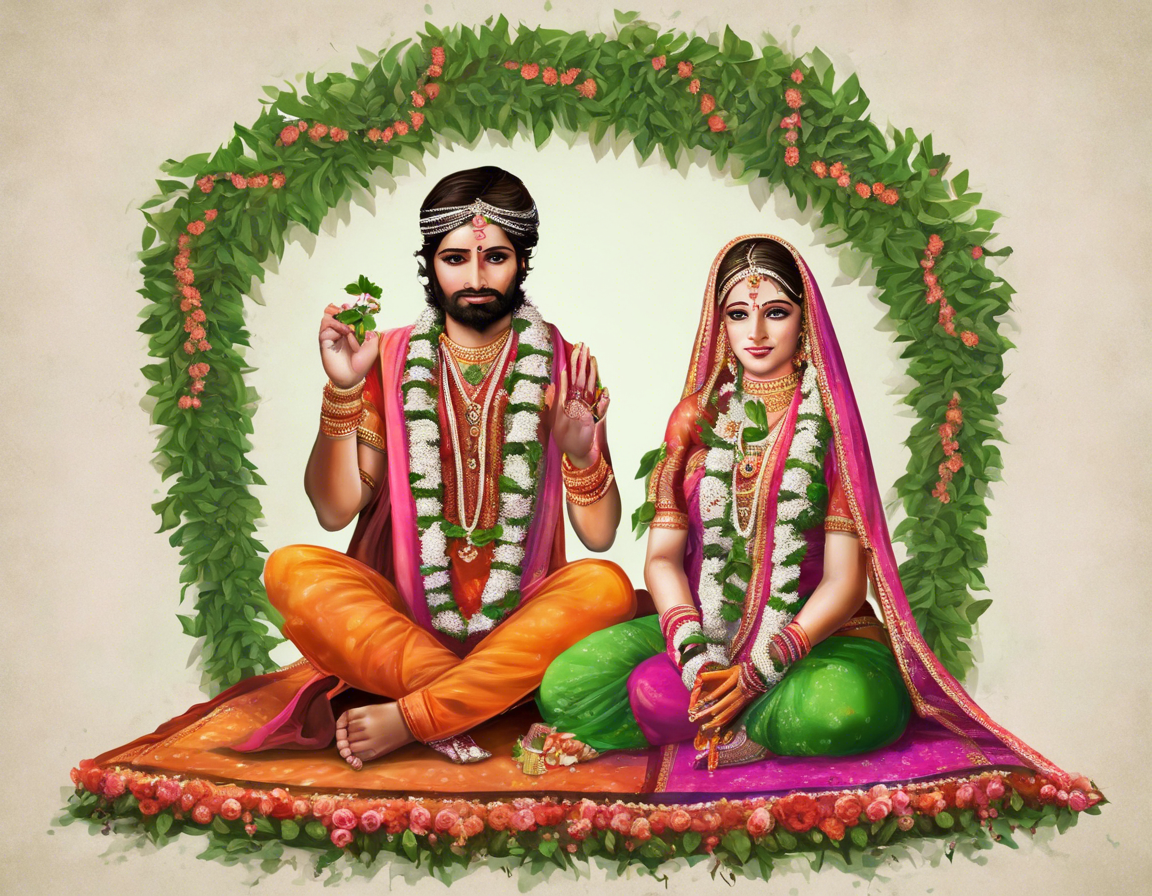The sacred and auspicious occasion of Tulsi Vivah is a significant ritual deeply rooted in Hindu traditions and beliefs. It symbolizes the ceremonial marriage of the beloved Tulsi plant (also known as Holy Basil) to Lord Vishnu, usually performed on the eleventh day of the bright half of the Hindu month of Kartik. This age-old custom holds immense importance in the Hindu culture and is celebrated with great reverence and devotion in various parts of the country.
Origins and Mythological Significance
According to Hindu mythology, the Tulsi plant is believed to be an incarnation of Goddess Lakshmi, the wife of Lord Vishnu. As the story goes, Tulsi was once a devoted woman named Vrinda, who was married to demon king Jalandhar. Due to her dedication and penance, she obtained a boon from Lord Vishnu that her husband would be immortal as long as she remained faithful to him. However, Vishnu disguised himself as Jalandhar and tricked Vrinda, which ultimately led to the demise of the demon king. In her grief and anger, Vrinda cursed Vishnu to turn into a stone (Shaligram) and herself into a plant. Thus, Tulsi Vivah is observed to ward off the curse and invoke the blessings of Tulsi as the bride of Vishnu.
Rituals and Celebrations
The ceremonial wedding of Tulsi to Shaligram or Vishnu is performed with elaborate rituals and traditions. Preparations for Tulsi Vivah begin days in advance, with the cleaning and decorating of the Tulsi plant, often placed in a specially constructed mandap or pavilion. The plant is adorned with flowers, turmeric, vermilion, and festive ornaments, symbolizing a bride ready for marriage. The marriage ceremony includes chanting of mantras, offering of prayers, circumambulation (parikrama) of the plant, exchange of garlands between Tulsi and Vishnu, and the performance of Vedic rites by a priest. The rituals culminate with the feast and distribution of prasad to devotees, marking the auspicious union of Tulsi and Vishnu.
Spiritual Significance and Benefits
Tulsi holds immense spiritual significance in Hinduism and is revered as a sacred plant with immense medicinal properties. It is believed that worshipping Tulsi and participating in the Tulsi Vivah ritual bestows numerous benefits on devotees. Some of the spiritual benefits include:
- Blessings: Invoking the blessings of Vishnu and Tulsi is said to bring peace, prosperity, and harmony to the household.
- Purification: The ceremony is believed to purify the mind, body, and soul of the devotees, dispelling negative energies and bringing about spiritual awakening.
- Health: Tulsi is known for its medicinal properties and is considered a potent herb for promoting good health and well-being. Worshipping Tulsi is said to bestow health benefits on the devotees.
- Prosperity: It is believed that those who perform the Tulsi Vivah ritual with devotion and faith are blessed with prosperity, success, and abundance in life.
Symbolism and Interpretations
The symbolic significance of Tulsi Vivah extends beyond the realm of religious rituals and holds deeper philosophical meanings in Hinduism. The marriage of Tulsi to Vishnu is seen as the union of the divine feminine energy (Shakti) with the divine masculine consciousness (Shiva), symbolizing harmony and unity in creation. The Tulsi plant is considered a manifestation of purity, devotion, and righteousness, embodying the ideal qualities of a devoted wife and a steadfast devotee. By participating in the Tulsi Vivah ceremony, devotees seek to cultivate these virtues within themselves and strengthen their relationship with the divine.
FAQs (Frequently Asked Questions):
1. What is the significance of Tulsi in Hindu culture?
Tulsi holds immense significance in Hindu culture and is considered a sacred plant associated with purity, devotion, and wellbeing. It is believed to be an incarnation of Goddess Lakshmi and is revered for its medicinal properties and spiritual benefits.
2. When is Tulsi Vivah celebrated?
Tulsi Vivah is usually celebrated on the eleventh day of the bright half of the Hindu month of Kartik, which falls between October and November according to the Gregorian calendar.
3. What are the rituals performed during Tulsi Vivah?
The rituals of Tulsi Vivah include cleaning and decorating the Tulsi plant, chanting of mantras, offering prayers, exchange of garlands between Tulsi and Vishnu, circumambulation of the plant, and the distribution of prasad among devotees.
4. What are the benefits of worshipping Tulsi during Tulsi Vivah?
Worshipping Tulsi during Tulsi Vivah is believed to bring blessings, prosperity, good health, and spiritual upliftment to devotees. It is also said to purify the mind, body, and soul of the worshippers.
5. Can Tulsi Vivah be performed at home?
Yes, Tulsi Vivah can be performed at home by individuals or families with devotion and sincerity. It is a personal and intimate ritual that can be observed within the sanctity of one’s home.
In essence, Tulsi Vivah is not just a religious ceremony but a profound spiritual practice that deepens one’s connection with the divine and instills virtues of devotion, purity, and righteousness. By honoring the divine union of Tulsi and Vishnu, devotees seek blessings, prosperity, and spiritual growth in their lives, making Tulsi Vivah a cherished tradition that continues to be celebrated with reverence and joy across generations.
